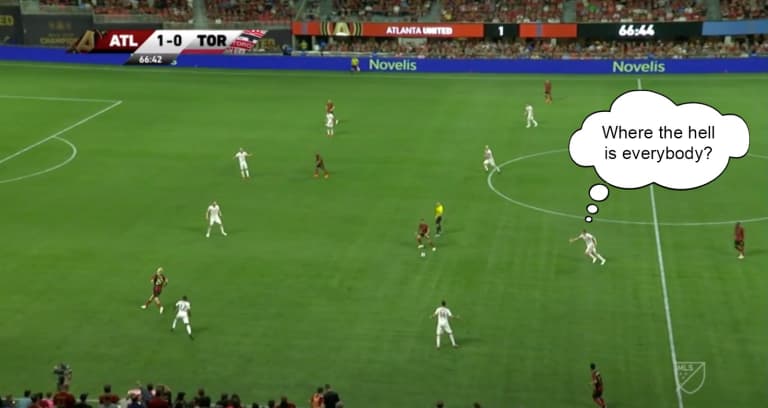Atlanta United's 2-0 win over Toronto FC was a continuation of what we've seen from the Five Stripes in recent weeks: Continued solid defense, along with a more energized Josef Martinez up top to give the attack some form and function.
No, Josef didn't score. But he didn't need to in order to set the tone. His off-the-ball work and link-up play have been stellar even as his finishing touch still mostly eludes him, and the simple fact is that when Josef is moving, the rest of the attack is going to find spots:
He got the assist here, but look at the hard, simple run he makes after releasing the pass to Julian Gressel. That opened the space Gressel needed to cut inside and rip one.
That play also showed some of the issues with Toronto FC playing a "pulley system," or "double pivot" instead of just a single, pure No. 6. The idea of the double pivot is for two players (in this case Michael Bradley and Liam Fraser) to share equally in all the things a defensive midfielder has to do – destroying opposing build-up play, winning 50/50s, distributing from deep, getting forward with late runs and protecting the backline.
When one player pushes up to attack, the other drops deep and central to orchestrate. When one pushes up to hunt the ball, the other is supposed to drop in to protect the spot in front of the backline. It can happen on one side, then it can happen on the other – hence the "pulley" effect.
When executed well a double pivot in theory covers more ground and dictates more of the game than a single No. 6 can manage, while being more difficult to play around or through simply because 2 > 1. When it's not done well, you get the play above.
The two players in the pivot as well as the strong-side CB have to work in tandem. If they don't, then double pivot has the habit of causing the exact problem it's supposed to solve: It opens up huge tracts of land in central midfield, right in front of the backline.
Fraser recognized TFC's problematic defensive shape pretty, pretty quick:

Atlanta did a good job of exploiting that bit of dislocation and hesitance in Toronto's defensive rotations. They weren't perfect – Josef's runs were a little bit early three or four times, and Pity Martinez still can't quite figure out what his role is – but the Five Stripes were mostly in the spots they were supposed to be, doing the things they were supposed to be doing.
It's more mechanical than it was, but that machine's now ground out four wins in five games.
The nightmare start really does look like a thing of the past and, for the first time all year, they can sleep the relaxed, dreamless sleep of a team resting above the playoff line.













